 60 citations,
July 2011 in “Stem Cells and Development”
60 citations,
July 2011 in “Stem Cells and Development” Certain signals and genes play a key role in hair growth and regeneration, and understanding these could lead to new treatments for skin regeneration.
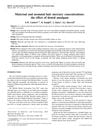 48 citations,
March 2003 in “BJOG: An International Journal of Obstetrics and Gynaecology”
48 citations,
March 2003 in “BJOG: An International Journal of Obstetrics and Gynaecology” Mothers and newborns with dental fillings had higher mercury in their hair, but getting fillings during pregnancy didn't raise mercury levels further.
 46 citations,
April 1977 in “Southern Medical Journal”
46 citations,
April 1977 in “Southern Medical Journal” Minoxidil causes excessive hair growth, but depilatory agent removes it safely and effectively.
 40 citations,
November 2016 in “Molecules”
40 citations,
November 2016 in “Molecules” Some plants used in traditional medicine may help treat cancer because they contain proteins that can inactivate ribosomes.
 37 citations,
March 1990 in “The Journal of Pediatrics”
37 citations,
March 1990 in “The Journal of Pediatrics” Toxic shock syndrome is caused by a complex interaction of bacterial toxins and the immune system, and understanding this can help improve diagnosis and treatment.
 34 citations,
June 2014 in “The BMJ”
34 citations,
June 2014 in “The BMJ” Pregnancy can change skin disease severity, with some conditions improving and others worsening, and treatment should balance benefits and fetal safety.
 34 citations,
August 2003 in “Clinical and Experimental Dermatology”
34 citations,
August 2003 in “Clinical and Experimental Dermatology” Pregnant women's hair gets thicker.
 34 citations,
August 2002 in “British Journal of Dermatology”
34 citations,
August 2002 in “British Journal of Dermatology” ALA-PDT is effective and safe for chronic X-ray dermatitis, providing complete or partial remission.
 29 citations,
September 2012 in “Birth Defects Research”
29 citations,
September 2012 in “Birth Defects Research” Wounds heal without scarring in early development but later result in scars, and studying Wnt signaling could help control scarring.
 28 citations,
March 2016 in “Toxicologic pathology”
28 citations,
March 2016 in “Toxicologic pathology” Dogs could be good models for studying human hair growth and hair loss.
 25 citations,
January 2006 in “Pharmacoepidemiology and drug safety”
25 citations,
January 2006 in “Pharmacoepidemiology and drug safety” SSRIs can cause hair loss, especially sertraline, with higher risk in women.
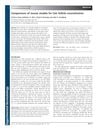 24 citations,
August 2011 in “Experimental Dermatology”
24 citations,
August 2011 in “Experimental Dermatology” The flap assay grows the most natural hair but takes the longest, the chamber assay is hard work but gives dense, normal hair, and the patch assay is quick but creates poorly oriented hair with some issues.
 23 citations,
October 2016 in “Journal of Midwifery & Women's Health”
23 citations,
October 2016 in “Journal of Midwifery & Women's Health” The document concludes that health care providers should offer culturally competent care and more research is needed to improve health outcomes for transgender individuals.
 21 citations,
November 2017 in “Archives of Dermatological Research”
21 citations,
November 2017 in “Archives of Dermatological Research” Higher enzyme levels found in women with hair loss, suggesting hormone imbalance.
 16 citations,
March 2007 in “The Veterinary clinics of North America. Food animal practice”
16 citations,
March 2007 in “The Veterinary clinics of North America. Food animal practice” Proper mineral supplementation in cow-calf operations prevents health issues and economic losses.
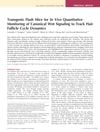 16 citations,
February 2014 in “Journal of Investigative Dermatology”
16 citations,
February 2014 in “Journal of Investigative Dermatology” Researchers developed a mouse model that tracks hair growth using bioluminescence, improving accuracy in studying hair cycles.
 15 citations,
November 2017 in “Drug Delivery and Translational Research”
15 citations,
November 2017 in “Drug Delivery and Translational Research” Certain extracts from Curcuma aeruginosa Roxb. and germacrone can boost the skin's absorption of minoxidil, a hair growth promoter, making it more effective.
 8 citations,
December 2020 in “The FASEB Journal”
8 citations,
December 2020 in “The FASEB Journal” Blocking adenosine A2B receptor may prevent or treat hearing loss.
 8 citations,
February 2017 in “Clinical Drug Investigation”
8 citations,
February 2017 in “Clinical Drug Investigation” Finasteride can cause sexual dysfunction and depression, which may persist and require hormonal treatment.
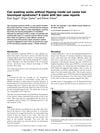 8 citations,
June 2016 in “Journal of Pediatric Orthopaedics B”
8 citations,
June 2016 in “Journal of Pediatric Orthopaedics B” Washing baby socks without flipping them inside out may increase the risk of Hair Tourniquet Syndrome.
 7 citations,
August 2000 in “Journal of Pediatric and Adolescent Gynecology”
7 citations,
August 2000 in “Journal of Pediatric and Adolescent Gynecology” To improve use of the contraceptive DMPA among adolescents, effectively manage side effects like menstrual changes and weight gain through counseling and guidance.
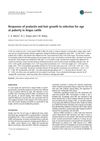 6 citations,
September 2010 in “Animal”
6 citations,
September 2010 in “Animal” Selecting Angus cattle for earlier puberty lowers prolactin levels but doesn't affect hair growth.
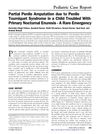 6 citations,
January 2013 in “Urology”
6 citations,
January 2013 in “Urology” An 8-year-old boy with bed-wetting issues suffered a severe penile injury from tying a thread around his penis, requiring urgent medical treatment to avoid worse outcomes.
 5 citations,
January 2018 in “Skin Pharmacology and Physiology”
5 citations,
January 2018 in “Skin Pharmacology and Physiology” Curcuma aeruginosa extract lotion significantly reduces underarm hair growth.
 1 citations,
March 2019 in “Actas Dermo-Sifiliográficas”
1 citations,
March 2019 in “Actas Dermo-Sifiliográficas” New cancer treatments are less harmful to hair but can still cause hair loss, color, shape, and growth changes.
 1 citations,
September 2017 in “Frontiers in Laboratory Medicine”
1 citations,
September 2017 in “Frontiers in Laboratory Medicine” Gut flora changes could potentially indicate depression, but more research is needed.
 1 citations,
November 2011 in “Dermatologica Sinica”
1 citations,
November 2011 in “Dermatologica Sinica” Women using hair relaxers with alopecia had lower zinc levels, suggesting zinc deficiency might contribute to hair loss.
 1 citations,
March 1992 in “Postgraduate Medicine”
1 citations,
March 1992 in “Postgraduate Medicine” About 40% of women by age 60 experience significant hair loss, often due to androgenetic alopecia, with treatments like minoxidil available and hope for future cures.
 January 2024 in “Women's health science journal”
January 2024 in “Women's health science journal” Hormonal imbalances are a key cause of missed menstrual periods in women.
 January 2024 in “International Journal of Medicine in Developing Countries”
January 2024 in “International Journal of Medicine in Developing Countries” Most people in Alahsa, Saudi Arabia, have low awareness of thyroid disease symptoms and risk factors.






























